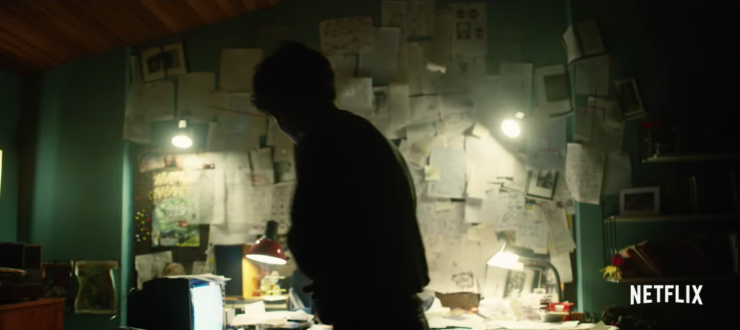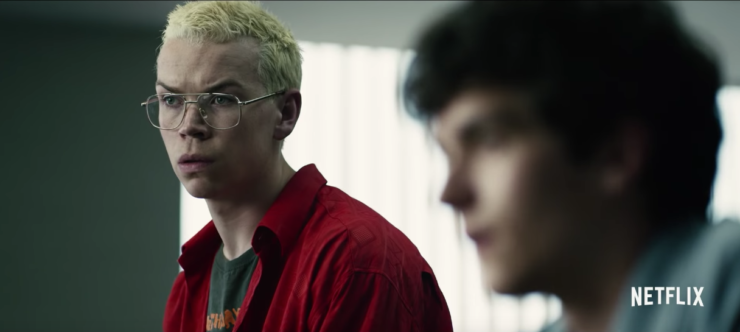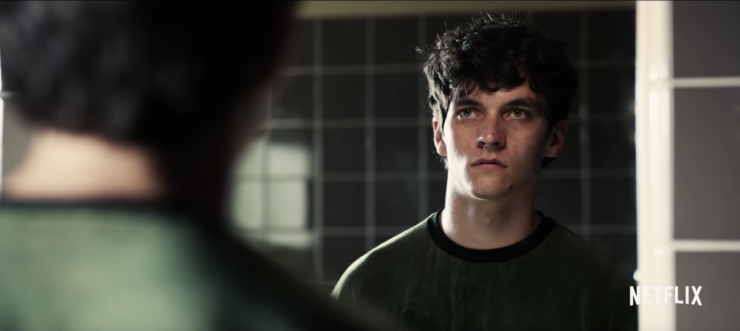Black Mirror: Bandersnatch is without a doubt the series’ most ambitious experiment in storytelling—and that’s saying a lot, since last season kicked off with an entire Galaxy Quest-esque episode. With Bandersnatch, Charlie Brooker and Annabel Jones abandon virtual realities for branching realities, putting control of the rumored 300+ minutes of footage into the hands of their audience. Through dozens of decision trees (which look just like the logo from “White Bear”), passive viewers become active players, deciding everything from what cassette troubled programmer Stefan (Dunkirk’s Fionn Whitehead) listens to on the bus to how to answer his increasingly existential pleas as his fate unspools.
It’s an intrepid move on the part not only of the creators but also Netflix itself, as one of the streaming service’s primary jokes is its tendency to prod viewers into confirming that, yes, they are still watching Friends 20 episodes in. But by the time you’ve satisfied yourself with the second or seventh ending of Bandersnatch, the story is less and less able to match the caliber of the experience of it; go down too many alternate paths, and the format begins to outshine the content. Then again, when was the last time you remembered the plot of a Choose Your Own Adventure novel after closing it?
Non-spoiler review follows, but we will be talking spoilers further down the post, so proceed with caution.
To provide too many plot details would defeat the purpose of walking in Stefan’s shoes, but the key details to know are that the story’s dramatic thrust is whether Stefan will be able to deliver his Bandersnatch demo to video game company Tuckersoft by Christmas 1984. The job is a plum assignment, as it allows Stefan to adapt his favorite dark fantasy novel, a CYOA novel of the same title by the enigmatic and disturbed Jerome F. Davies. It also gets him out of the house, under the warily watchful eye of his glum father (Craig Parkinson), for a reason other than therapy with the sympathetic-but-also-withholding Dr. Haynes (Alice Lowe) to discuss the loss of his mother in early childhood, for which he blames both himself and his dad. Tuckersoft rock star Colin (The Maze Runner‘s Will Poulter), responsible for their popular games Metlhedd and Nohzdyve, seems keen to help Stefan both with his creative process and in really evaluating how much agency he has in his various professional and personal decisions.
At points both mundane and pivotal, you the viewer are prompted to choose one of two actions; you have ten seconds to do so, or (its own fun experiment) let the program do so for you. From there, the narrative follows a typical CYOA model: Some plots are dead ends, either surprisingly immediately or after you’ve invested considerable time and mental energy trying to guess the typical Black Mirror twist or devastating punny turn. In most of these cases, you’ll be redirected to a checkpoint that allows you to choose the alternate path from a major moment… or you’ll revisit the same moment but be prompted with a different choice.
Because as much as Bandersnatch has been marketed as CYOA, its structure hews a bit closer to a roguelike game, in which the player retraces paths or takes alternate routes with privileged information and/or items. This expands the scope of what consequences follow Stefan’s choices, and makes for perhaps the largest and most delightfully bonkers tonal shift we’ve seen from Brooker. It wouldn’t be Black Mirror without the interactive narrative attaining self-awareness.

On our first go, my group (it’s fun to play Bandersnatch by committee) played straight through to what I would believe is the episode’s “truest” ending, judging from the end credits style and how many threads it ties together. That said, we missed a key Act 2 decision that led to an equally satisfying ending, one of the last ones we reached after two hours of noodling around and noticing the recurring alternate choices we were presented with. Depending on what your first ending is, you may find subsequent conclusions anticlimactic, or that the repetitive paths leading there lose their effectiveness with each iteration. At some point, it becomes less alluring to invest the time in starting over from the very beginning; that seems to be where the rumored five hours of footage comes from, though we were satisfied after two hours.
As is the case with any game, YMMV with Bandersnatch. This television event will reward its players’ ingenuity with its various creative solutions and some laugh-out-loud choices, but neither the characters nor core story are strong enough to withstand a half-dozen repetitions of the same key moment.

Do you want to talk spoilers?
Yes | Fuck Yeah
Some of my favorite moments were when the episode aimed more for ambiguity than on-the-nose dialogue. Hearing Colin say “as much as you have a choice” multiple times in the same scene (let alone the same story path) is much less interesting than him ranting on an LSD trip about government conspiracies, with it unclear whether he has actually lived countless parallel lives and or if he just has really good drugs.
To that end, my personal favorite ending was the P.A.C.S. one, in which both Stefan’s parents and therapist are actors and/or scientists, incepting trauma in childhood and tracking his growing awareness of the powers that be tracking their experiment. It adds a sinister edge to so many preceding moments, and thematically mimics “White Bear” beyond just the overwhelming presence of the logo. It also felt the most typically Black Mirror, including all of the Easter eggs like Saint Juniper Hospital, where Rolo Haynes worked in “Black Museum”… and the fact that he shares a surname with Stefan’s therapist Dr. Haynes, who definitely is watching her patient with the look of someone waiting for the other person to figure out a puzzle.
Or maybe I’m just like Stefan, seeking clues and drawing lines between moments because I need it to tie together neatly. In which case, Brooker and Jones know how to cater to my kind of viewer.
Then there’s the ending with an adult Pearl (the first one we achieved), in which history repeats itself to an astonishing degree: Bandersnatch is a hit for Tuckersoft, until the revelation of Stefan following in JFD’s footsteps to the point of decapitating his poor father. Pearl reboots Bandersnatch for Netflix… which means what we’ve been watching for however many hours was her creation… and then she gets caught in the same White Bear decision tree. This felt like the most spiritually fitting end for this particular episode, and highlighted this technology especially well—which has always been the point of a Black Mirror story.
The tech’s ability to prompt the viewer, while incredibly useful to pivot certain decisions to the one you know you should have chosen, also proves frustrating at points. Once it feels like even we viewers are on a predetermined path, it takes away some of the fun of leading your own adventure.
There are so many more branches I could have followed, but let’s take this to the comments! Which ending(s) did you get? Where did you give up, and what were your favorite/least favorite moments?
The roguelike suggestion comes from Natalie Zutter‘s husband; she would have said more Groundhog Day, or Happy Death Day. Talk Black Mirror with her on Twitter!











This was quite the experience. My first run through had the ending where Stefan just dies while speaking to the therapist after going back in time and retrieving his bunny, just in time to go with his mother.
I loved the small touches and references back to choices which you only appreciate after the fact.
I also think the best ending is the one where Pearl reboots the game and restarts the cycle. The illusion of free will.
Interesting as a one off experiment, but god I hope this does not catch on. I don’t think that I want this much engagement with tv on a regular basis. It is bad enough that serialisation has robbed genre tv of any spontaneousness rewatching, but if it starts demanding that I have to LARP every show then I’m going to spend more time gardening.
If I wanted this I’d play a computer game.
Free will isn’t an illusion, and denying it is an excuse for every stupid thing you do.
I turned this off when given the choice to kill the father in one way or another. That’s not a choice I was willing to make. I was further put off by the story rewinding unrealistically several times without rhyme or reason. I must have watched it for an hour and a half without any resolutions. It just kept going back to the beginning.
This is apparently why NetFlix was in talks with Tell Tale. Talks that fell through, and was the last step in their financial collapse. Which is a shame, because Tell Tale would be so much better at writing it than this.
Just as games fail when they try to be too much like movies/shows, so do the others when they try to be like games. The writing styles are very different and it is pure hubris to think one could be subsumed by the other.
All these talks about “free will being an “illusion”,” (which is a very specific, very suggestively-worded quote) is getting tired. The blame of the dysfunction of the societal systems in the West shouldn’t trickle down to the common man.
The themes I’m seeing arise about alternate realities and the praise of slavery to dysfunction takes away from concrete critique about the true reality we live in; I’m disappointed Black Mirror would trade away critical observations of technology and man for cheap, nihilistic dialogue and mind-tricks similar to the narrative of conversations between angsty teenagers on Twitter.
In my opinion, if they wanted to critique the concept of illusions inside the mind, it would have been more stimulating to touch upon how we define ourselves and the way we build our ego in this society.
I’m looking forward to season 5 and better storylines.
In democracies, that is exactly who is to blame for social dysfunction. Like Douglas Adams once said, you’ve got to stop voting for the lizards.
I got the “0 stars” and “PACS” endings, but it didn’t end, just ran me through another iteration of the loop. The one that broke me out of the loop was the “Mike?” ending. (I also had the chance to take the “train” ending, but didn’t.)
I didn’t get the Pearl ending, but I’ve seen it on YouTube. I still think the “Mike?” one that I got is my favourite.
Watched just one story
Was quite intrigued that I could guide the story
Discovered that choice wasn’t really an option – if you don’t want to talk about “your” mother then that’s all she wrote – the end
The therapist said it best. If this is entertainment, shouldn’t it be more interesting? Which of course was followed by the most entertaining scene in the episode.
As a childhood fan of real choose-your-own-adventure books, I was expecting more than the forced course-correction, meaningless options presented just so Black Mirror can make a flawed reference to free will as an illusion. Also, who came up with these picks? What’s the difference between telling more and trying to explain? And dammit I don’t need to talk about Mommy every damn session, lady! :P
At least I got the best ending the first time around:
1. Take the deal.
2. Get your first game out the door (a by-the-numbers committee game that often sells even if high-brow critics like to scoff)
3. “I’ll try again!” (The right attitude)
4. Everyone’s alive (and mental health is still intact)
5. Job at game company complete with resources and mentor on staff. Maybe less of a deadline since Christmas is over now. (Tell me, is there anyone out there who likes the initial premise of the story who wouldn’t be envious of this job/ending?)
Sounds like the beginning of a potential career in game design with your foot already in the door.
What’s brilliant about this “episode” of Broken Mirror is that it is not just about the “illusion of free will”, but it’s about the illusion of the “illusion of free will”. So many sci-fi stories are based on the illusion of free will, which we see in Bandersnatch. Play through enough branches and you start to believe that you have free will and the characters in the episode are realizing they only have the illusion of free will because you are deciding their paths. But, after you play through enough branches, you realize so many of them just lead to the same end results, and you start to think it’s actually you who have the illusion of free will.
But then as you play through more and more of the branches of the episode, you realize there are large sections that give the illusion of free will, but there are actually several distinct endings, so the illusion of free will is actually an illusion. And as some people have said, one of the endings lies in our ability to simply exit to credits at various points and stop watching.
So, the entire episode is an amalgam of free will illusions wrapped in several executions of our free will. I really love what they did with it, but I don’t think this could become a thing, because how many different ways can you do what they did in this episode without simply duplicating the process that produced it?
In the end, I probably spent about 5-6 hours exploring all the branches in the episode, obviously many of them repeatedly from different directions like I say above. It really is a quite brilliant one-time experience, but not something that I would want to watch again at this point.
I don’t know what I would think of Bandersnatch were in any other show, but this is Black Mirror: half the episodes are about how technology makes us immoral monsters who consider other people as our playthings. It seems to me that the concept is to give us a few choices, so we want to explore all of them, including the ones that make murderers of us.
Well, Undertale has already done that, and better. In Undertale, you actually feel bad when doing a genocide run, it’s less pleasant to play (in Bandersnatch, you go for the extreme endings just to see something actually interesting happen and make going through the same scenes again worth it), it’s hard to resist, you’re not left off the hook for watching the results of the run rather than playing it yourself (whereas here, you can just go and find the scenes you missed on a streaming platform with no moral cost), and most importantly, you actually care for the characters, despite having spent hours toying with their fate.
I ended with the Netflix gonzo meta ending. Fuck Yeah! LOL. My twin sister and I both played and her ending was the one where Stefan killed and buried his father. The whole thing took me about 2hrs too! It gets tedious after a while, so I was thankful when I finally made a decision that led to an ending!
First time… we (me + my wife) didn’t finish. It was boring, the pause for choosing your answer was too long.
Second time I did it by myself. Although it was still quite boring, I finally got the “train” ending (before that I took the deal and jumped Stefan off the balcony, and buried father). Media critic says: two-and-a-half stars!
Mine went off the rails after a bit, as I couldn’t help but choose the Netflix option, it was just too tempting a choice. I got the fight in the therapist’s office, which sent me back a bit but kept looping back until I finally got the movie set ending, so I need to find time to re-watch it.